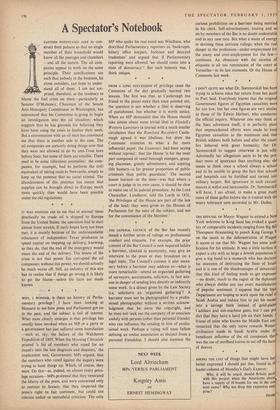WONDER, is there no h • istory of Parlia- mentary privilege?
I have been looking at Hansard to see how press and Parliament got on . in the past; and the subject is full of interest. What most clearly emerges is -that privilege has usually been invoked when an MP or a party or a government has just suffered some humiliation —such as, say, the failure of the Walcheren Expedition of 1809. When the Morning Chronicle printed 'a list of members who voted for an - inquiry into the late disgraces and disasters,' the implication was, Government M Ps argued, that the members who voted against the inquiry were trying to hush things up. Which, of course, they were. On this—as, indeed, on almost every privi- lege occasion—MPs-protested that they venerated the liberty of the press, and were concerned only to restrain its _licence; that they respected the press's right to: fair, comment, but could • not tolerate unfair or untruthful criticism. The only MP who spoke his real mind was Windham, who described Parliamentary reporters as 'bankrupts, lottery office keepers, footmen and decayed tradesmen' and argued that if Parliamentary reporting were allowed 'we should come into a state of democracy' ! But such honesty was, I think unique.
* *


































 Previous page
Previous page